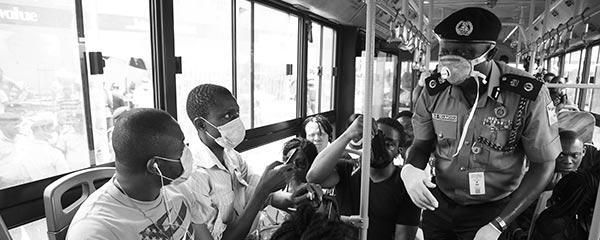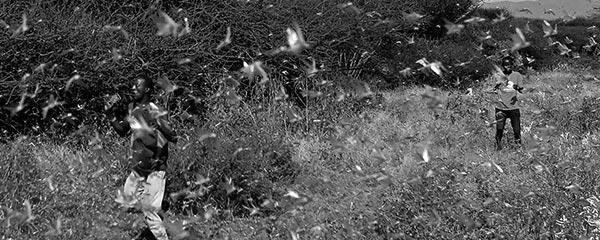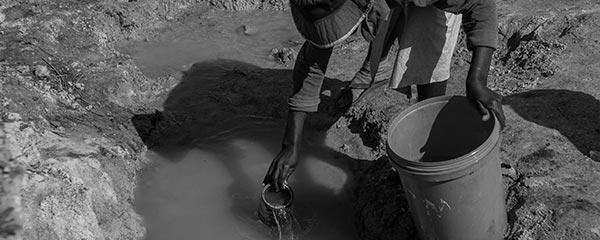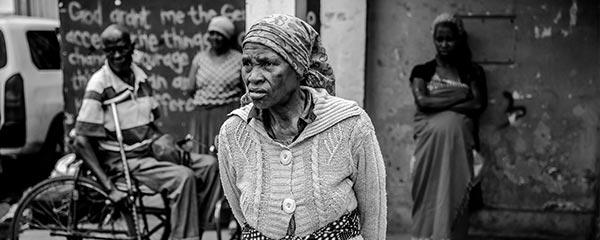Story Highlights
- Record-high 66% in sub-Saharan Africa lacked money for food in past year
- 2019 marks the seventh consecutive yearly increase
- 82% in drought-stricken Zambia said they didn't have enough money for food
WASHINGTON, D.C. -- Before the COVID-19 pandemic, 66% of adults in sub-Saharan Africa reported that there were times in the past year when they did not have enough money for food that they or their family needed. This figure marks a new high in nearly 15 years of World Poll research on the subcontinent and the seventh consecutive year of increases since 2012 when 51% said they had lacked money for food that they or their family needed.

Line graph. Trend line showing the percentage of people in sub-Saharan Africa who said they had been unable to afford food that they or their families needed at times in the past year.
According to the FAO's 2019 report The State of Food Security and Nutrition in the World, conflict, drought, climate change and economic downturns have all contributed to the state of increased hunger in sub-Saharan Africa in recent years. This situation will likely be further compounded in 2020 by an economic slowdown resulting from COVID-19 and the worst locust swarms to hit East Africa in 70 years.
People are struggling to afford food in all corners of the African subcontinent, with 17 of 35 sub-Saharan African countries surveyed reaching new historical highs or matching previous highs on this measure. Among them are several of Africa's larger economies -- Nigeria (75%), South Africa (63%) and Ethiopia (57%).
In Zambia, where the worst drought in a century slowed famed Victoria Falls to a trickle, 82% of adults in 2019 reported not having enough money to buy food, the highest in sub-Saharan Africa and one of eight countries in Africa where at least three in four adults said they lacked money for food.
Zimbabwe, once a breadbasket of Africa, is also notable among countries on the subcontinent suffering from the most food hardship. Last year, 81% of Zimbabweans reported they did not have enough money to afford food, but as recently as 2011, 39% said the same. A confluence of weather events and economic mismanagement has contributed to rising food prices in the country, including a doubling in the price of maize, a Zimbabwean staple. Today, the World Food Programme estimates that half of Zimbabwe's 15 million people need food aid.
| Yes | |||||||||||||||||||||||||||||||||||||||||||||||||||||||||||||||||||||||||||||||||||||||||||||||||||
|---|---|---|---|---|---|---|---|---|---|---|---|---|---|---|---|---|---|---|---|---|---|---|---|---|---|---|---|---|---|---|---|---|---|---|---|---|---|---|---|---|---|---|---|---|---|---|---|---|---|---|---|---|---|---|---|---|---|---|---|---|---|---|---|---|---|---|---|---|---|---|---|---|---|---|---|---|---|---|---|---|---|---|---|---|---|---|---|---|---|---|---|---|---|---|---|---|---|---|---|
| % | |||||||||||||||||||||||||||||||||||||||||||||||||||||||||||||||||||||||||||||||||||||||||||||||||||
| Zambia | 82 | ||||||||||||||||||||||||||||||||||||||||||||||||||||||||||||||||||||||||||||||||||||||||||||||||||
| Rwanda | 81 | ||||||||||||||||||||||||||||||||||||||||||||||||||||||||||||||||||||||||||||||||||||||||||||||||||
| Zimbabwe | 81 | ||||||||||||||||||||||||||||||||||||||||||||||||||||||||||||||||||||||||||||||||||||||||||||||||||
| Lesotho | 78 | ||||||||||||||||||||||||||||||||||||||||||||||||||||||||||||||||||||||||||||||||||||||||||||||||||
| Sierra Leone | 76 | ||||||||||||||||||||||||||||||||||||||||||||||||||||||||||||||||||||||||||||||||||||||||||||||||||
| Congo Brazzaville | 76 | ||||||||||||||||||||||||||||||||||||||||||||||||||||||||||||||||||||||||||||||||||||||||||||||||||
| Nigeria | 75 | ||||||||||||||||||||||||||||||||||||||||||||||||||||||||||||||||||||||||||||||||||||||||||||||||||
| Guinea | 75 | ||||||||||||||||||||||||||||||||||||||||||||||||||||||||||||||||||||||||||||||||||||||||||||||||||
| Eswatini | 74 | ||||||||||||||||||||||||||||||||||||||||||||||||||||||||||||||||||||||||||||||||||||||||||||||||||
| Gabon | 74 | ||||||||||||||||||||||||||||||||||||||||||||||||||||||||||||||||||||||||||||||||||||||||||||||||||
| 2019, ranked by percentage yes | |||||||||||||||||||||||||||||||||||||||||||||||||||||||||||||||||||||||||||||||||||||||||||||||||||
| ║┌┴¤═° World Poll | |||||||||||||||||||||||||||||||||||||||||||||||||||||||||||||||||||||||||||||||||||||||||||||||||||
The gap in the affordability of food between the highest and lowest income groups of Africans has narrowed significantly in recent years. In 2012, there was a 31-percentage point gap on this measure between the region's richest 20% and its poorest 20% (64% vs. 33%). Seven years later, the difference has shrunk to just 14 points (71% vs. 57%), as those in the top income group are now 24 points more likely to say they have lacked money for food in the past 12 months.

Line graph. Trend line in the percentage of Africans in the poorest 20% and richest 20% who were struggling to afford food that they or their families needed at times in the past year.
Bottom Line
Despite relatively weak healthcare systems, sub-Saharan Africa as a whole has largely avoided, so far, the worst of the global coronavirus pandemic. However, it is unlikely to escape the economic fallout, which threatens to exacerbate a food situation already trending in the wrong direction.
On June 8, the World Bank forecasted that coronavirus-related economic turmoil could lead to Africa's first recession in 25 years, with growth as low as -2.8%, the lowest on record. While 60% of African workers are estimated to work in agriculture, the subcontinent's own food security remains closely linked to the overall health of global trade.
As a result of the COVID-19 crisis, the number of people living in "acute food insecurity" could more than double in Africa this year, according to World Food Programme projections. This major global crisis comes at a particularly difficult time, on the heels of seven years of consistent increases in Africans' inability to buy food. As African governments maintain little fiscal ability to soften the economic blow of coronavirus in their own countries, international efforts to renegotiate African debt and maintain open trade may prove nearly as key as the international community's ability to rally food aid.
Learn more about how the works.




